CBC
Sun, October 22, 2023

A new course at McGill University is putting a spotlight on Indigenous health care, and Indigenous students are the driving forces behind it.
The course, called "Indigenous Worldviews in Health Delivery and Research," debuted this fall. It's available to graduate students at the School of Population and Global Health (SPGH), which is part of McGill's faculty of medicine and health sciences.
The key role Indigenous students play in shaping this program makes it a first among all Canadian universities, according to McGill. Indigenous staff and faculty also played a role in shaping the new course.
It examines the effects of colonialism on Indigenous communities, specifically as it pertains to their experiences in hospitals. The case of Joyce Echaquan, an Atikamekw woman who recorded herself moments before her 2020 death as hospital staff hurled racist insults at her, is among those being explored. It also looks as Indigenous health research ethics.
The course's co-creator, Sidney Leggett, a master's student who is Métis, said the push to create this course began a year ago when students noticed a gap in what they were learning. Students eligible for the course are enrolled in programs that allow them to work in fields such as public health, occupational health, biostatistics and epidemiology.
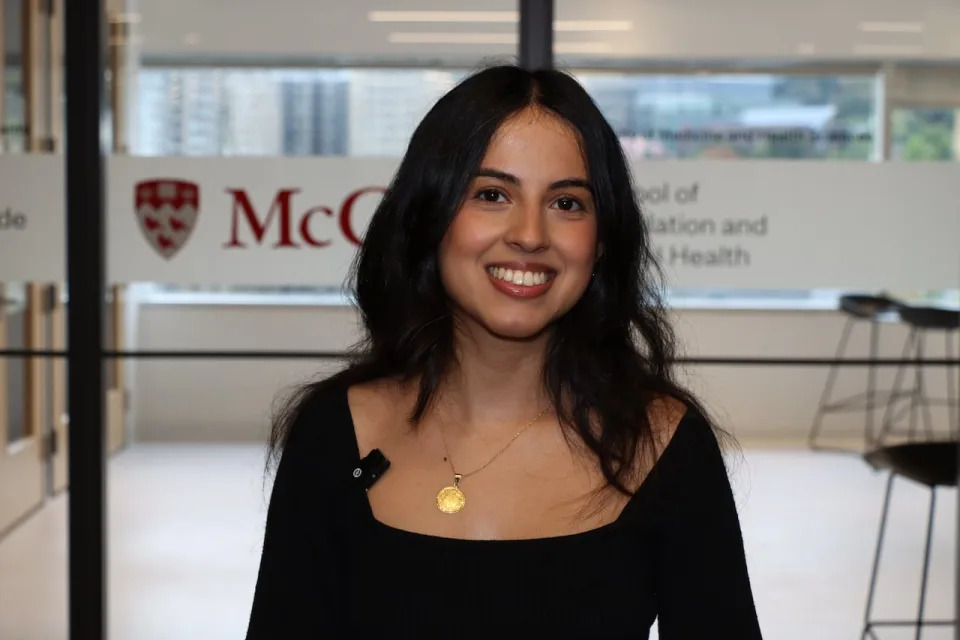
Anglena Sarwar, a master's student at McGill, is one of the first students to enrol in the 'Indigenous Worldviews in Health Delivery and Research' course. (Matt D'Amours/CBC)
"For either an epidemiologist or a public health expert, you're generally going to be in some kind of policy-making role and making policy in Canada means that you're making policy that affects Indigenous people," said Leggett.
"Students just felt that they were going through all these methods courses, intensive courses and were kind of missing that piece."
It was important to "Indigenize" the curriculum, according to Anyana Banerjee, an assistant professor at McGill and the SPGH's lead on equity, diversity, inclusion and anti-racism.
She said being able to grasp the history and current realities surrounding Indigenous health gives graduates — regardless of their background — the tools to break the cycle of discrimination in health care.
Anglena Sarwar, who is working to get a master's degree in public health, says she's passionate about equity and social justice and felt this class was a perfect fit.
She says she's learned a lot in just a few a weeks — enough to realize that wrapping her head around the realities of Indigenous health care is a process that will continue well past this semester.
"It's going to be a continuous process throughout my life. I'm never going to have all the right answers," Sarwar said.

Students who participate in the new course are enrolled in programs that allow them to eventually work in fields like public health, epidemiology and biostatistics. (Mat D'Amours/CBC)
"No matter what, I'm going to be a learner. It doesn't matter if I have my master's. I'm going to be working with communities, people who have better knowledge than me."
The course isn't mandatory, though that could change in the future.
Leggett hopes it contributes to having more Indigenous students choosing fields like epidemiology.
"At the end of the day, that will be the strongest baseline in Canada to build a successful equity and policy-making foundation," Leggett said. "It's to have Indigenous people in the room."
New partnership agreements struck to support northern Quebec Cree health hubs
CBC
Mon, October 23, 2023
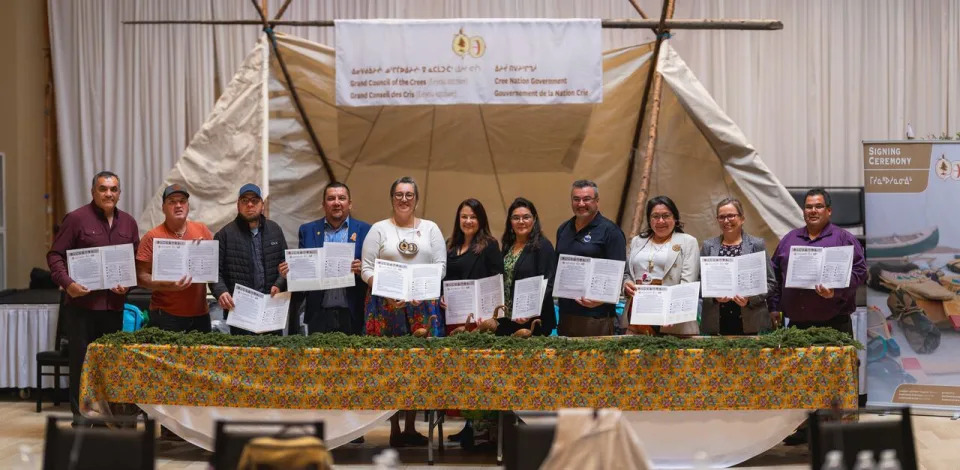
Leaders of several Cree organizations have signed a historic agreement they say will help address some long-standing health and social issues, like intergenerational trauma, chronic illnesses and high rates of addictions.
On Sept. 22, leaders from the Cree health board, Cree Nation Government (CNG) and Cree School Board signed a new Community Miyupimaatisiiun Committee Partnership agreement to improve overall well-being for Cree people in northern Quebec communities.
"The nation was too split up, doing their own thing without considering working together because we're all serving the same people," said Bertie Wapachee, the chairperson of the Cree Board of Health and Social Services of James Bay (CBHSSJB).
Instead of addressing one part of an issue, we can do it all together [such as] alcoholism, bootlegging or drug addiction and drug trafficking," said Wapachee.
"Miyupimaatsiiun," in English, roughly translates to "healthy living."
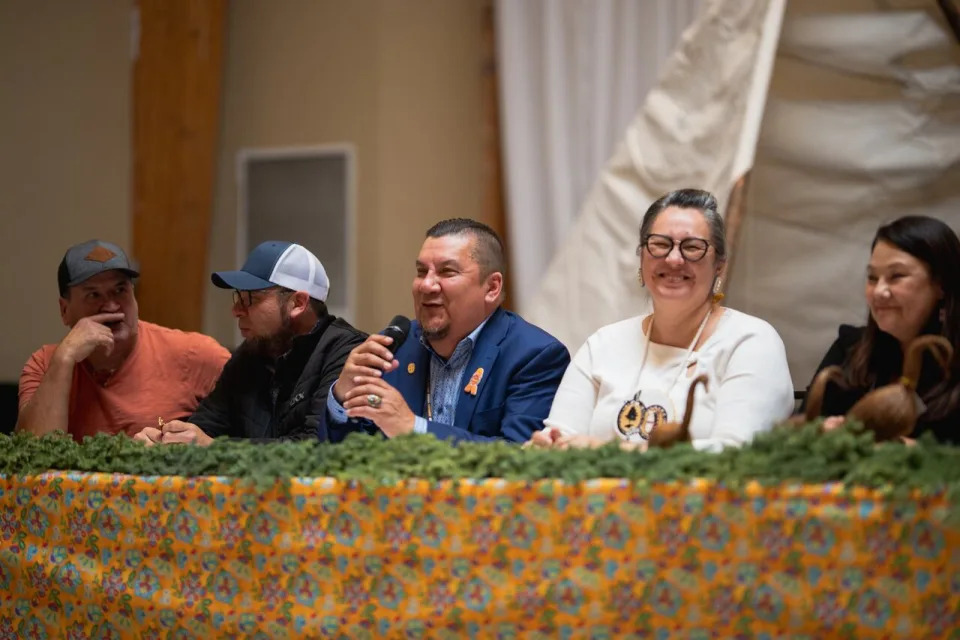
Bertie Wapachee, middle, speaks about the importance of shared responsibility toward healthy living of all Cree in Eeyou Istchee. They signed the agreement in Chisasibi on Sept. 22. (Marcel Grogorick/CBHSSJB)
Community Miyupimaatisiiun Centres (CMC) are existing local health hubs in Cree communities that offer general medicine, home care and dentistry, among other services.
Each community also has a Miyupimaatisiiun committee made up of local leaders and community members, some of whom represent regional Cree organizations and entities. They are mandated to identify three local health and social priorities and suggest solutions, according to a release about the signing. The idea is to better support and bridge the local CMC committees with regional entities and resources.
Mandy Gull-Masty, the current Grand Chief of Eeyou Istchee, said that she is looking forward to the mandate beginning.
"We are inter-connected, but we know every community also has diverse needs … The Miyupimaatisiiun committees are critical to finding successful solutions that are Cree-driven," said Gull-Masty, in a press release.
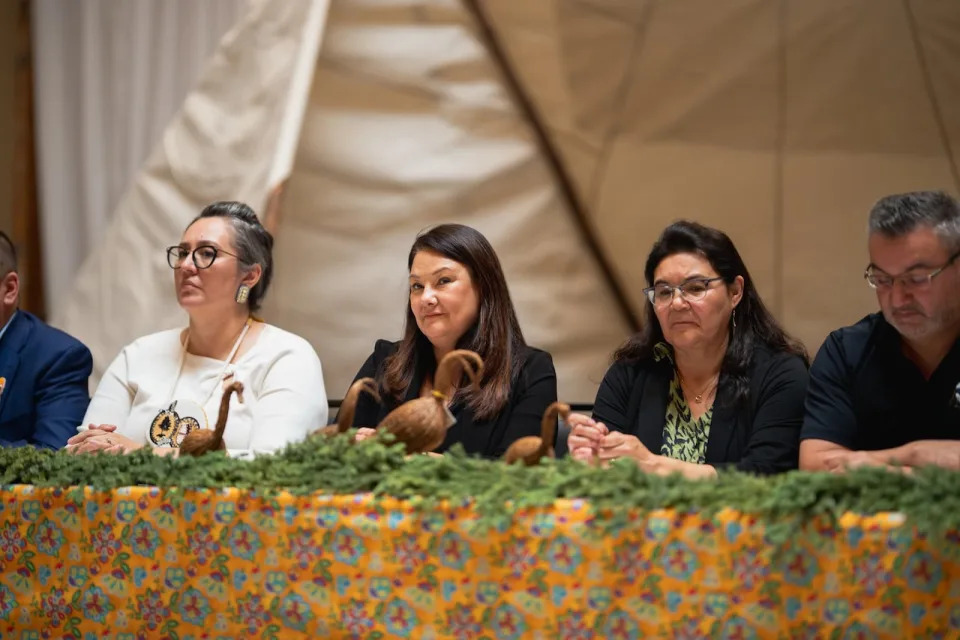
Sarah Pash, second from left, is the chairperson for the Cree School Board. She says collaboration is important for meaningful action. (Marcel Grogorick/CBHSSJB)
Leaders of Cree organizations say they will support the Miyupimaatsiiun committees in programming and projects.
Priorities could be anything from youth mental health, Cree customary adoption or chronic conditions such as diabetes, among others, according to a Cree health board press release.
One of the other entities signed onto the agreement is the Cree School Board.
"The effects of the pandemic, compounded with the issues we face in our communities as a result of intergenerational traumas, necessitate a focus on physical, emotional, spiritual, and mental well-being in our schools," said Sarah Pash, chairperson for the Cree School Board.
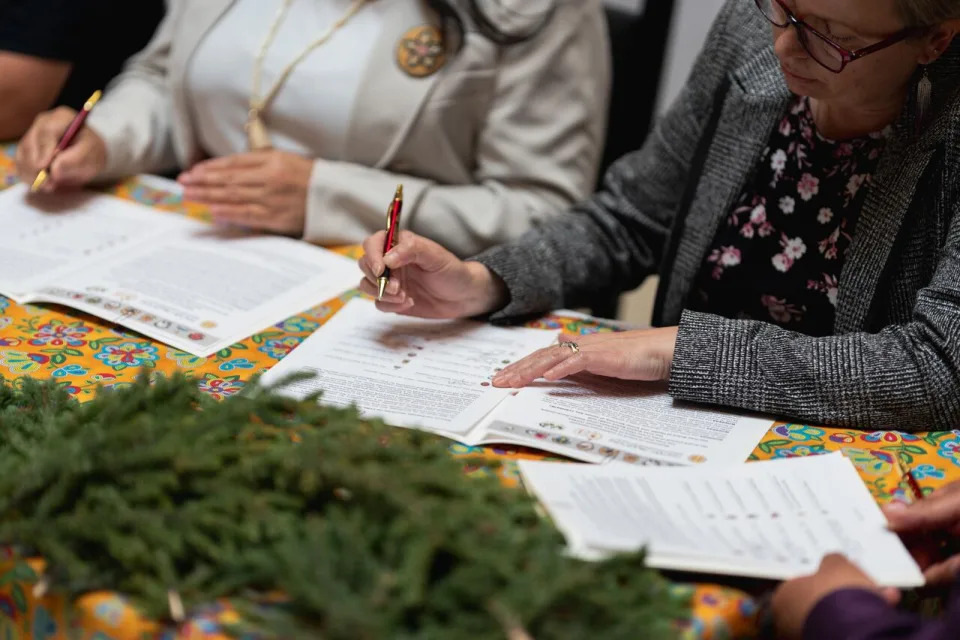
Members of the CBHSSJB, CNG, CSB and nine chiefs from Eeyou Itschee signed the new Community Miyupimaatsiiun Committee Partnership. (Marcel Grogorick/CBHSSJB)
The regional partners and local committees are in the early stages of figuring out how the committees will work and how they can be best supported.Their aim is to work together toward a healthier nation in all aspects of life.
"Whatever action plan they come up with, we'll do our part in contributing [funding] to their action plan," said Wapachee, adding the level of collaboration is something that has never been done before.
They start meetings soon, Wapachee said, adding he's looking forward to moving to a Cree model of what health and well-being looks like.
"The four elements in life — the physical health, emotional health, mental health and spiritual health — have to be balanced," said Wapachee. "That's what we're all seeking and that's what we all deserve."
No comments:
Post a Comment